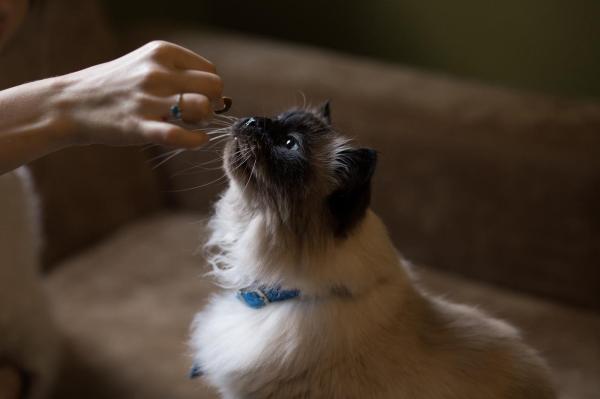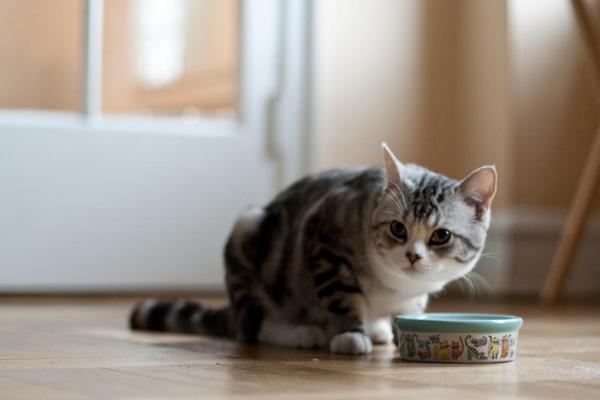
Cats don't tend to have the same gluttonous reputation of dogs. Although it will all depend on the individual animal, they will often be satisfied with their regular diet. They will meow when it is time to be fed and can come running at the sound of a rustling treat packet, but they will also leave food in their bowl to eat later. Some cats may have a more intense relationship to food. Not only will they eat everything you put in their dish, but they snap up any morsel dropped on the floor, follow you around the kitchen in an anxious manner or generally seem to be obsessed with food to an unhealthy degree.
If your cat is obsessed with food, it is something which will likely worsen if not addressed. Food obsession in cats is not a healthy dynamic as it implies an anxiety which can harm their well-being. It is also a possible sign of disease, so a veterinary assessment is also useful. Keep reading AnimalWised to find out why my cat is obsessed with food and what we can do about it.
Why is my cat obsessed with food?
To understand why a cat has become obsessed with food or has developed such an obsession over time, we need to look at their relationship to food and the context of this behavior. Before we do so, we need to look at some practical considerations. Specifically, we need to see how much the cat is eating.
Most domestic cats are very good at self-regulating their food intake. You can give them a dish of food in the morning and they will eat as much as they need throughout the day. Not all cats take this same approach. Some may not eat very much, others will eat it all in one go. The result will be seen in the cat's body. If they eat too little, they will be too thin and they will be overweight if they eat too much.
See the ideal size your cat should be with our article on how to tell if a cat is overweight.
If the cats is not eating their regular feed, but is obsessed with the food you eat, it could be their food is inappropriate. A cat's diet needs to be adapted to their individual needs. This includes their age, health status and individual preference. For example, if we have a senior cat, we should not give them food for kittens as it will likely be too rich.
When a cat is obsessed with food and overweight, it could be a different issue. It may not be the quality of the food, but how you give it to them. Cats are creatures of routine. If we feed them at an irregular schedule or forget meals altogether, it can cause them to feel food insecurity. They feel like their next meal is not guaranteed, so they will eat everything in sight to prepare for the worst. The result can be an overweight cat obsessed with food.
Most cats only need to be fed 1 or 2 times a day. If they are not being fed sufficiently or are receiving poor quality food, they will always be looking for More. This is both to fill themselves up and to nourish themselves. Additionally, if we give them lots of treats throughout the day, they can develop an unhealthy relationship to food and expect it all the time.
If you are unsure what you should be feeding your feline, take a look at our guide to the best diet for cats.
Food obsession as a symptom of disease
There may be a hereditary aspect of your cat's food obsession. Some cats tend to have a genetic predisposition to having a larger appetite. This can be difficult to determine and the distinction between breeds is not as noticeable as in dogs. We can see that Siamese cats often eat too quickly, but it does not necessarily mean they are obsessed with food.
Whether genetically inherited or acquired later in life, certain diseases will have an influence on a cat's approach to food. Some of these are hormone related. If the release of hormones is improper, the brain sends signals which make the cat feel hungry, even if they have already eaten their required nutrition. Others affect the cat's appetite in other ways. Here are some common examples of diseases which can lead to overeating in cats:
- Parasitosis: while external parasites are less likely to affect their diet, internal intestinal parasites in cats often create problem eating. If a cat has worms or other parasites in their gastrointestinal tract, they can absorb nutrients otherwise meant for the cat and make them feel the need to eat more. They can even eat without putting on much weight.
- Diabetes: when a cat has low blood sugar, they will often eat and drink more to stabilize themselves. If a cat has diabetes, they will need to be medicated to redress the hormone imbalance in their body.
- Hyperthyroidism: an overactive thyroid gland will have various effects on your cat. One common one is an increased appetite and obsession with food. This doesn't mean they will necessarily become overweight. On the contrary, hyperthyroidism is a common reason why a cat eats, yet remains skinny.
- Cushing's syndrome: this is a set of symptoms which is also related to hormone production, specifically when the adrenal or pituitary glands produce too much cortisol (for this reason it is often known as feline hyperadrenocorticism). This can lead to an increased appetite and obsession with food. Learn more with our article on Cushing's disease in cats.

Eating disorders in cats
It has been discovered that cats can suffer from emotional psychological disorders that lead to harmful behaviors. This includes obsession with food. Your cat could be suffering from the disorder known as psychogenic abnormal eating behavior. It is psychogenic because the disorder has an emotional or psychological rather than physical origin. Some may describe it as a kind of food addiction.
The causes are still unknown, but treatment is based on training and behavior modifications, known as behavioral therapy. You should first take your cat to a veterinarian to rule out a physical disorder, then speak to a feline educator or ethologist, especially if you observe the following signs:
- Even after eating their own food, the cat takes food from other animals in the home.
- They beg for food while you're eating and may even jump up to take food directly off your plate or a counter.
- Meowing or hissing desperately while you prepare their food dish.
- Excessive attention-seeking behavior.
- Attempt to eat objects and items that are not food.
Part of your cat's rehabilitation will require the following adaptations:
- Ensure you have sufficient play time and interaction with them.
- Boredom is associated with stress in cats which can produce a desire in the cat to eat even if they are not hungry.
- Reward good behaviors and ignore bad ones.
- Enrich the home environment with walkways, scratching posts, toys, cat houses and more.
It is very important, we do not bring out lots of food in the home, except at mealtime. This applies not only to cat food, but also to human food. This is because a cat obsessed with food is not likely to make a distinction between the two.

How to stop food obsession in cats
There are some guidelines you can follow at home to prevent food obsession. It is important to monitor your cat's progress as you do so. You may be able to get rid of the food obsession, but keep in mind this requires patience and can take a long time. Consistency will be part of the long-term solution. Here are some tips for a food-obsessed cat:
- Try to provide the best quality food possible. This ensures their diet contains a high level of protein that will help keep them fuller for longer. You may want to introduce more wet cat food as it can satiate the cat more. Take a look at our article on the healthiest wet cat food for more.
- A couple of times a week, add a small amount of wet food to their dry food and mix it up. This will make it more appetizing to them and they should stop wanting other food.
- At the same time, dry food will make your cat want to drink more water and this will help keep them healthy and satiated.
- Never leave food out during the day. Stick to routines. Feed them at two regular times or help them adapt to only small amounts several times a day.
- Ignore them when they petition you for food. Leave the room if necessary and do not reward them as they will only assimilate the wrong behaviors.
- Restrict your cat's exposure to food of any kind. Do not eat in front of them, adapt their eating schedule to yours and eat together, where possible.
- Spend quality time with your cat, this will make them feel less bored and help to lose food anxiety.
Conversely, you may have a cat with a different attitude to food. This can be equally harmful to their health. Take a look at our article on why a cat is not eating to learn more.

If you want to read similar articles to My Cat Is Obsessed With Food, we recommend you visit our Behavioral problems category.